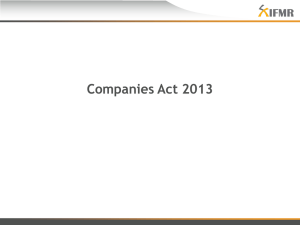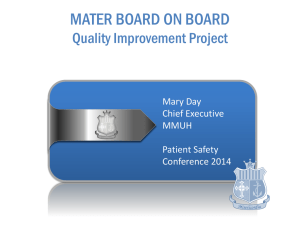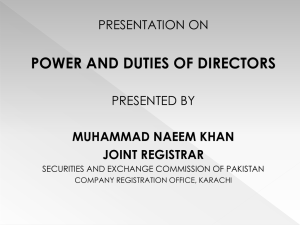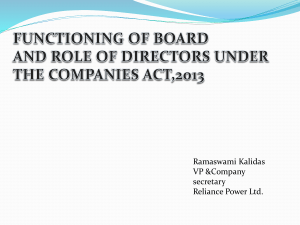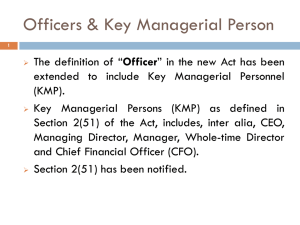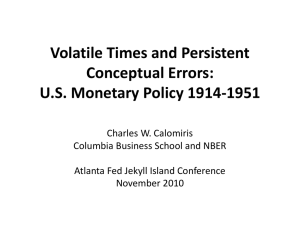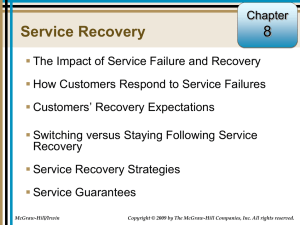Board Meetings and Power of Boards
advertisement
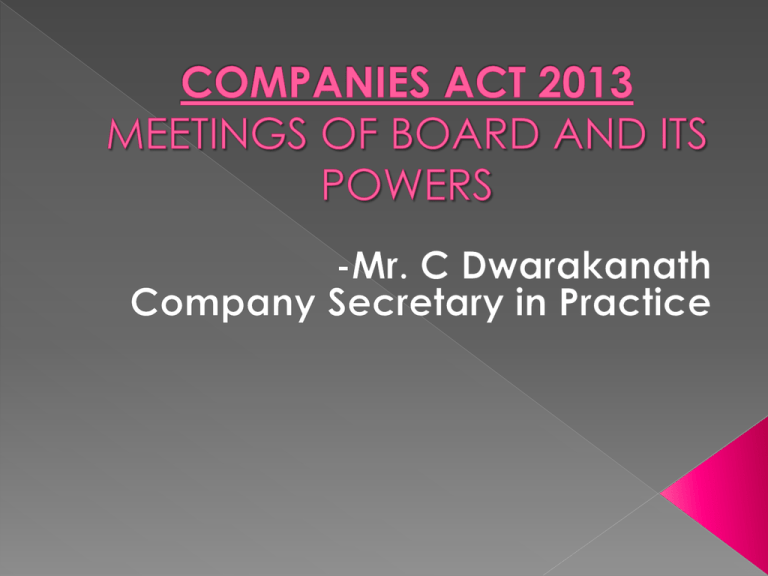
173 (1): First Board Meeting Minimum Number of Meetings Interval between two consecutive board meetings Exemption by notifications 173 (2): Means of Participation of Directors in a meeting Matters shall not be dealt in a meeting through video conference- Requirements and Procedures under draft Rules: 1. Whether attending Board Meeting in person is mandatory. 2. Notice of meeting shall be sent to all the directors 3. Notice shall contain the option to attend Board Meeting. Continued…… Continued…… 4. Whether Director (s) opting to through video conference is/are confirm. participating required to 5. Which is the place of Board Meeting. 6. At the end of the meeting the summary of the meeting proceedings shall be announced along with the names of Directors who have assented/dissented the from decisions Continued…… 7. Whether Draft minutes to be circulated among all the Directors? 8. Whether all Directors have right to comment on the drat minutes ? 173 (3): Notice period of Board Meeting. Mode of issuing of notice 173 (3): Shorter Notice to consider urgent business. 173(4): Default in giving notice, every officer liable to a penalty of Rs. 25,000/- 173 (5): One Person Company, Small Company and Dormant Company. Where there is only one director in OPC. 174 (1): Quorum for meetings of the Board 174 (2): If the number is reduced below the quorum. 174 (3): Interested Directors for the purpose of quorum: If the number of interested Directors is equal to/ more than 2/3rd of total strength of the Board. 174 (4): Adjourning the Board Meeting for want of Quorum: Explanation: 1. Any fraction of a number shall be rounded off as One 2. Total strength does not include directors whose places are vacant 175 (1): Conditions for passing resolutions by circulation 1. resolutions has to be circulated in draft, together with necessary papers, if any. 2. Circulate to all the Directors, or members of the committee, as the case may be. 3. Circulate at the address of the Directors registered with the Company in India 4. Circulate by hand delivery or by post or by courier, or through such electronic means which may include email or Fax prescribed in the draft rules. Continued…… Continued…. 5. Resolutions circulated have to be approved by a majority of the Directors 6. Can Director say the matter/motion under circulation be decided at Board Meeting. 175 (2): Whether resolutions passed by circulation should be taken note by the Board ? 176: Any act done by a person as a Director shall not be invalid till it is discovered that his appointment is invalid/defective. 177 (1): Criteria for constituting Audit Committee Every listed Company Every other Public Company having: Paid up capital of Rupees One Hundred Crore or more; or Aggregate outstanding loans or borrowings or debentures or deposits exceeding Rupees Two Hundred Crore. 177 (2): Composition Consist of 3 Directors with majority of independent directors. Qualifications of members Majority of members including its Chairman shall be persons with ability to read and understand the financial statement. 177 (3): Transitional period reconstitution for constitution/ - One year from the date of commencement of Companies Act, 2013 177 (4): Duties/Powers/Responsibilities 1. Recommendation for appointment, reappointment appointment of Auditor. 2. Review and monitor auditor’s independence and performance of Audit Process. 3. Examining report. 4. Approval of related party transaction. Financial Statement and Auditors’ Continued….. Continued…… 5. Scrutiny of inter corporate loans and investments. 6. Valuation of Company. 7. Valuation of internal financial control and risk management systems. 8. Monitoring the end use of funds raised through public and related matters. undertakings and assets of the 177 (5): Audit Committee may call for comments of the auditors about scope of audit, financial statements, internal and statutory auditors and management of the company. 177 (6): The Audit Committee shall have the power: 1. to investigate matters specified in section 177 (4) 2. to obtain professional advise from external source 3. to have access to records of the Company 177 (7): Auditors and KMP shall have right to be herd in the meeting of the Audit Committee but shall not have the right to vote. 177 (8): Disclosure in Board’s Report shall be made: The constitution of the Audit Committee, If not constituted, the same shall be disclosed with reason thereof. 177 (9): Vigil Mechanism shall be established for directors and employees. Criteria: 1. Every listed Company 2. Companies which accept deposits from the public 3. Companies which have borrowed money from banks and public financial institutions in excess of Rupees Fifty Crore 177 (10): Purpose: To provide for adequate victimization of persons. safeguards against To make provision for direct access to the Chairperson of the Audit Committee. Constituting Vigil Mechanism shall be disclosed in the website of the Company and in the Board’s Report. 178(1): Nomination and remuneration committee Criteria: - Every listed Company and such other classes of companies as may be prescribed. Constitution: - 3 or more non-executive directors out of which not less than half shall be independent directors. Chairperson of the Company may be appointed as the member of the Nomination and remuneration committee but shall not chair such committee. 178 (2), (3) & (5): Duties/ Powers: 1. Identify persons who are qualified to become directors 2. Recommend to the Board for appointment or removal 3. Carry out the performance. evaluation of every Director’s 4. Formulating criteria for determining qualifications, and independence of directors. Continued….. Continued….. 1. Recommend to the Board a policy relating to the remuneration for the Directors, KMP and other employees. 2. Such remuneration policy shall be disclosed in the Board’s report. 178 (5): Stakeholders Relationship Committee Criteria: Company having more than 1000 share holders, debenture holders, deposit holders and any other security holder at any time during the financial year. Members : Chairperson shall be non- executive director Other members as may be decided buy the Board 178 (6): Purpose: - To consider and resolve the holders of the company. grievances of stake 178 (7): Attending General Meeting: - The Chairperson of each committee / any member of the committee authorized by him in this behalf shall attend the general meeting of the Company. 179(1): Scope of the Board - Entitled to exercise all such powers and to do all such acts, things, as the company is exercise and do. - No such powers shall be exercised by the Board which are to be exercised by the Company in general meeting 179 (3): Powers to be exercised at Board Meeting: 1. 2. 3. 4. 5. To make calls on shares in respect of unpaid shares To authorize buy back of securities under Section 68 To issue securities in or outside India To borrow monies To invest the funds of the Company Continued…… Continued…… 8. To grant/give loan/guarantee/securities for any loan To approve financial statement and Board’s report To diversify business of the Company 9. To approve amalgamation, merger / reconstruction 6. 7. To Take over a Company/acquire a controlling or substantial stake in another company 11. Any other matter which may prescribed. 10. 1. 2. 3. 4. 5. 6. Powers to be exercised at Board Meeting [As per draft Rules for Chapter XII]: To make political contributions To fill a casual vacancy in the Board To enter into a joint venture /technical or financial collaboration To commence a new business To shift the location of a plant or factory or the registered office To appoint or remove (KMP) and senior management personnel one level below the KMP Continued…. Continued…. 7. To appoint internal auditors 8. To adopt common seal 9. To take note of the disclosure of director’s interest and shareholding 10. To sell investments held, constituting 5 % or more of the paid – up share capital and free reserves of the investee company 11. To accept public deposits and related matters 12. To approve quarterly, half yearly and annual financial statements Delegation of powers: The Board may, by passing resolutions, delegate its power to any committee or the managing director or the manager or any other principal officer of the Company; the following powers: To borrow monies To Invest Funds of the company To Grant loan/give guarantee/ Provide securities in respect of loans Powers to be exercised only with the consent of the Company by Special Resolution: 1. To sell, lease or otherwise dispose off the whole or substantially whole of undertakings of the company. 2. To invest otherwise in trust securities the amount of compensation received it out of merger or amalgamation Continued……. Continued……. 3. To borrow money, where money to be borrowed, together with the money already borrowed will exceed the aggregate of paid up capital and free reserves. 4. To remit or give time for the repayment of any debt due from a director. Conditions, limits, particulars of the powers to be exercised by the Board to be stipulated in special resolution. Debt incurred by the Company in excess of the limit prescribed, shall be invalid, unless the lender proves that he has acted in a good faith. Section 180 is now applicable to all the companies. 181: Board may contribute to bona fide charitable and other funds. If aggregate amount exceed 5% of its average net profits for the 3 immediately preceding the financial years, prior approval of the Company in general meeting is required for contribution under this section. 182 (1): Criteria: A company other than: a Government company and a company which has been in existence for less than 3 financial years may contribute any amount, directly or indirectly, to any political party. 182 (1): Limit: - not exceeding 7.5% of average net profit during the 3 preceding financial years. Prior approval of the Board is required for authorizing to make contribution under this section. 182 (3) & (4): Disclosure in Profit and loss Account: Total amount contributed Name of the political party 182 : Points of noting: - Contribution to any person for political purpose is not allowed. - For the purpose of this section, “political Party” means a political party registered under Section 29A of the Representation of the People Act, 1951 183 (1): power of the Board The Board of directors may contribute such amount as it deem fit to the National Defense Fund or any other fund approved by the Central Government for defense. 183 (2): Disclosure The total amount contributed under this Section shall be disclosed in profit and Loss account. 184 (1): Every Director shall: At his first meeting of the Board in which he participate; and At the first meeting of the Board in every financial year; or wherever there is change in the disclosure already made, at the first meeting after such change; disclose his concern/interest in any other Company/Body corporate/firms/other association of individuals, by giving notice in writing in Form No. 12.1. Notices received by Directors under this Section shall be preserved and kept at the registered for 8 years as per the draft Rules. 184 (2): Disclosure of arrangement: interest/ concern in contract/ Every interested Director shall disclose the nature of interest/concern in any contract/arrangement, entered or to be entered with: A body corporate in which such director/ in association with any other director holds more than 2% shares/ is a promoter/manager/ CEO of that body corporate A firm or other entity in which such director is a partner / owner / member. 184 (2): The interested director shall not attend the Board meeting in which the contract in which he is interested is to be considered. If the directors becomes interested after entering in to contract/arrangement, the same shall be disclosed forthwith. 184 (3): Voidable Contracts: A contracted entered in to by the Company without disclosure under this section or with participation of interested director shall be voidable 184 (4): Contravention and Penalty Director in default shall be punishable with imprisonment for a period of 1 year or a fine of Rs. 50,000 to Rs. 1 Lakh or with both. 184 (5): Between two companies-Exempt if 2% or less of paid-up capital held by Director(s) 185 (1): No Company shall give loan, provide security/ guarantee / for its director or any other person in whom the director is interested. This provision shall not apply to: Giving any loan to MD/WTD as part of the conditions of service applicable to employees or pursuant to shareholders approval by special resolution. In ordinary course of business, giving loan/ providing guarantee/securities for the due repayment of any loan for which interest is charged at a rate not less than Bank rate declared by RBI. 185 (2): Contravention and penalty: - Company: punishable with Rs.5 Lakh to 25 Lakh - Director/Person in default: punishable with imprisonment of 6 months or with fine of Rs.5 lakh to 25 lakh or with both. Other Aspects/New Aspects: Provisions of this Section is applicable to both private company as well as public company. The requirement of permission of Central Government for giving loan to Director as required under the Companies Act, 1956 has been dispensed with. The exemption given to loan/guarantee/security granted or provided by any Holding Company to its Subsidiary or the exemption given to Private Company has been dispensed with. 186 (1): A company can make investment through not more than 2 layers of investment companies. Acquiring a company incorporate outside India and such company has investment subsidiaries beyond two layers as per laws of its home country. A subsidiary company having any investment subsidiary for meeting statutory requirements. 186 (2): Limit: A company shall not: Give loan to any person/body corporate; Give any guarantee/provide security in connection with any loan to any body corporate; and Acquire by way of subscription, purchase or otherwise, the securities of other body corporate; exceeding 60% of paid capital, free reserves and security premium account or 100% of free reserves and security premium account whichever is more 186 (3): Providing Loan etc., exceeding limit: Prior approval (Special resolution) at general meeting is required. 186 (4): Disclosure: Disclosure in financial statements to be made about the loan/guarantee/security given. 186 (5): Unanimous Consent and Prior Approval: Unanimous consent of the Board and Prior approval of the public financial corporation is required for providing loan/guarantee/security under this section. 186 (6): Following Companies shall not take inter-corporate loan or deposits exceeding the limit as may be prescribed: Companies registered under SEBI Act, 1992 Such companies as may be notified by the Government 186 (7) & (8): Loan can’t be given at a rate of interest lower than prevailing yield of 1 year, 3 year, 5 year or 10 year Government Security closest to the tenor of the loan Company defaulting in payment of any deposit or interest thereon, can not give or provide any loan/Security/Guarantee. 186 (9) & (10): Company giving loan / guarantee or providing security or making an acquisition under this section shall maintain register in Form No. 12.2. Entries to be made in registers with particulars of loans and guarantees given, securities provided. Entries to be made in chronologically within 7 days of making loans/guarantees/securities or acquisition. Continued…… Continued…. Register shall be kept in the registered office of the Company and entries in the registers shall be authenticated by the Secretary of the Company or any other authorized person by the Board. The register shall be kept open to inspection; and Extract and copies of register to be furnished to any members of the company on furnishing the fee as mentioned in the Articles of the Company which shall not exceed Rs.10 per page 186 (13): Contravention and Penalty Company: punishable with fine not less than Rs. 25, 000/- but may extend to Rs. 5,00,000/- Every officer in default: punishable with imprisonment for 2 years and fine not less than Rs. 25, 000/- but may extend to Rs. 1,00,000/- Other Aspects/New Aspects: Any intermediary associated with capital market can not take inter corporate loan, deposits exceeding the limit as may be prescribed. Exemption to NBFC whose business is acquisition of shares and securities. While considering limits for making investment, providing loan/guarantee/security, the investment, loan, guarantee, security already provide shall not be considered. Other Aspects/New Aspects: The exemption given to following from under Companies Act, 1956 has been dispensed with: Private Company; Acquisition by holding company the securities of its wholly owned subsidiary; Loan made by holding company to its wholly owned subsidiary; and To any guarantee/ security provided by a holding company in respect of any loan made to its wholly owned subsidiary. the 187: All investments made or held by a Company in any property, security or other asset shall be held in its own name. The Company may hold any shares in its subsidiary company in the name of any nominee of the Company, if required to meet statutory requirement. Particulars to be mentioned in the Register in Form No. 12.3, where the securities are held in any other name in terms of this Section along with the reasons for such holdings. 187: Contravention and Penalty - Company: punishable with fine not less than Rs.25,000/- but may extend to Rs.25 Lakh - Officer in default: punishable with imprisonment of 6 moths or with fine not less than Rs.25,000/- but may extend to Rs.1,00,000/- or with both. 188 (1): Approval of the Board by passing resolution at the meeting is required to enter into contract with related party with respect to : Sale/purchase/supply of any goods or materials; Selling/otherwise disposing of, buying property of any kind Leasing of property of any kind; Availing/rendering of any services; Appointment of any agent for purchase/sale of goods/services/property; Underwriting the subscription of any securities of the Company; Related party’s appointment to any office or place of profit. 188 (1): Conditions to be satisfied as per draft Rules: Notice calling for meeting of the board shall disclose: Name of the related party, nature of relationship Nature, duration, particulars of the contract Material terms of contract including value, if any Any advance paid/received for the contract Any other information relevant for the Board to take decision The interested director shall not present at the meeting during discussion of agreement as mentioned in this section. Conditions and limits as prescribed under draft rules for Certain contracts with related Parties: Company having paid up share capital of Rs. 1.00 Crore or more shall not enter into contract/arrangement with any related party; or Company shall not enter in to any transactions where the transactions to be entered into a) Taken together with previous transactions during the financial year, exceeds 5% of the annual turnover or 20% of the net worth of the company as per last audited financials, whichever is higher ; or Continued…… Continued…. b) Relates to appointment to any office or place of profit in the Company, its subsidiary company or associate company at a monthly remuneration exceeding Rupees One Lakh; or c) For a remuneration for underwriting the subscription of any securities/derivatives thereof of the company exceeding Rupees Ten Lakh. except with the prior approval of the Company by a Special Resolution. continued……. Member shall not vote on such special resolution, to approve any contract to be entered by the Company, if he is a related party thereon. The provisions of this section shall not apply to any transactions entered in ordinary course of business , other than transactions which are not at arm’s length Price. Every contract entered in under this section shall be disclosed at the Board’s report. 188 (5): Ratification: Contract entered in to by the director/employee with out prior approval by the Board/ approval by the Shareholder and if the same is not ratified by the Board/Share holders within 3 months from the date of entering in to contracts, such contracts shall be voidable at the option of the Board Contravention and Penalty Contravening director of a listed Company: imprisonment for a term of 1 year or fine not less than Rs.25,000/- which may extend to Rs. 5,00,000 or with both. Contravening director of other Company: fine not less than Rs.25,000/- which may extend to Rs. 5,00,000. 189: Every Company shall maintain one or two registers in Form No. 12.4 and shall enter the particulars of: Companies/body corporate/ firms in which the directors are interested. Contracts/arrangements with a body corporate of firm or other entity in which any director is interested. Contract, Arrangements entered with a related party. Extract of registers shall be provided to any member within 7 days from the request there on upon the payment of such fee as prescribed in the Articles of the Company but not exceeding Rs. 10 per page. 189: Registers to be kept open for inspection at the registered office of the Company. The registers shall be produced at the Annual general Meeting and shall remain accessible during the continuance of the meeting. 189: The provisions shall not apply to any contract/ arrangement – For the sale/purchase/supply of goods, materials or services, if the value of such goods and materials or the cost of such goods in aggregate does not exceed Rs. 5.00 Lakh per year. By a banking company for the collection of bills in the ordinary course of business. Contravention and Penalty Every Director contravening the section and the rules there under shall be liable to a penalty of Rs.25,000/- 190: Every Company shall keep at its registered office; A copy of contract with a Managing Director/ Whole time Director (if it is in writing); or A written memorandum setting out terms of contract with Managing Director/ Whole time Director (if it is not in writing) 190: Copy of contract/ memorandum shall be kept open for inspection by any member without payment of fee Contravention and Penalty - Company: shall be liable to penalty of Rs. 25,000/- Officer in default: shall be liable to a penalty of Rs. 5,000/- for each default. Provision shall not apply to private Company 192: A Company shall not enter into any arrangement by which a Director of the company or of its Holding Company or any person connected with him can acquire assets for the consideration other than cash from the Company & vice versa without the prior approval of Company in General Meeting. Where the Director/ connected person is a director of its holding company, then resolution from Holding Company will also be required. 192: The notice for approval in general meeting under this section, from both the Companies ( holding and subsidiary), shall include particulars of the arrangement along with the value of asset duly calculated by Registered Valuer. 193: Where One person Company enters in to contract with the sole member who is also director of the company, unless the contract is in writing, the terms of the contracts; are contained in the Memorandum; or are recorded in the minutes of the first Board Meeting held after entering in to contract 193: Every contract entered in to by the Company under this section shall be intimated to the Registrar of Companies within 15 days of its approval by the Board 194: Prohibition forward dealing in securities of the company by Director/KMP 195: No Director/KMP of a company shall involve in insider trading of securities of the Company. Thank you
